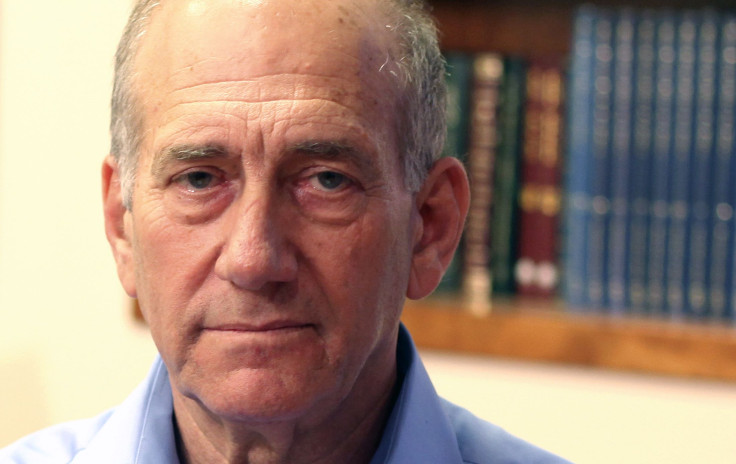Ehud Olmert, Former Israeli Prime Minister, Sentenced To 8 Months In Jail For Corruption

Former Israeli prime minister Ehud Olmert was handed down an eight-month jail term on Monday for accepting cash bribes from an American supporter, reports said. Olmert was convicted of corruption in March and also faces a six-year jail term in a separate corruption case.
Olmert, who was granted a 45-day stay on his sentence, was also given a suspended sentence of an additional eight months, along with a fine of $25,000, the Associated Press reported. His lawyers said they would appeal the sentence in the country's supreme court. The prosecution had asked that Olmert be sentenced to at least one year in prison, for accepting bribes from American businessman Moshe Talansky, but the court ordered a lesser sentence in recognition of Olmert's contributions to Israeli society.
The 69-year old leader, who was prime minister between 2006 and 2009, is currently also appealing a six-year sentence handed down to him last May, for corruption in a real estate deal. In this case, he was convicted of accepting bribes to speed up the development of a residential locality, called Holyland, when he was mayor of Jerusalem in the 1990s, BBC reported.
Following Monday’s verdict, Olmert's lawyer Eyal Rozovsky, said that his team was “very disappointed” with the ruling.
The team said in a statement, according to Haaretz, that the sentence "only adds to the severe suffering he has already been through," adding: “The punishment is very severe, especially in light of the circumstances of Mr. Olmert, who stepped down from his position as prime minister due to the investigations, removed himself from the public sphere for the several years duration, gave up his high position, and forfeited the benefits he was entitled to as a former prime minister.”
Olmert was forced to resign in 2009 amid the bribery allegations, which ended his political career and made way for Benjamin Netanyahu to take over as prime minister, BBC reported.
“We believe these things were sufficient reason to soften the punishment of a man who was convicted of bribery offences that were allegedly made some 13 years ago. As it has been proven to the court, Mr. Olmert contributed much to the security of the State of Israel, to the strengthening of its international standing and to the welfare of its citizens – and it would have been appropriate had these things been taken into account," the statement said, according Haaretz.
In the Talansky case, Olmert was accused of not reporting the money and filing false reports with the state comptroller. He was acquitted of these charges in July 2012 as allegations that he spent the money for personal use could not be proved at the time. However, one of Olmert's former associates, Shula Zaken, who became a state witness last year, helped prove that the money was in fact used for personal purposes, causing the acquittal to be reversed. The court also accused Olmert of lying and the prosecution had demanded a harsher sentence.
The prosecution said, according to Haaretz: “His cynicism shook the rafters,” adding that Olmert did not “express any remorse or cooperate with the authorities, lying to police and the courts.”
© Copyright IBTimes 2024. All rights reserved.












